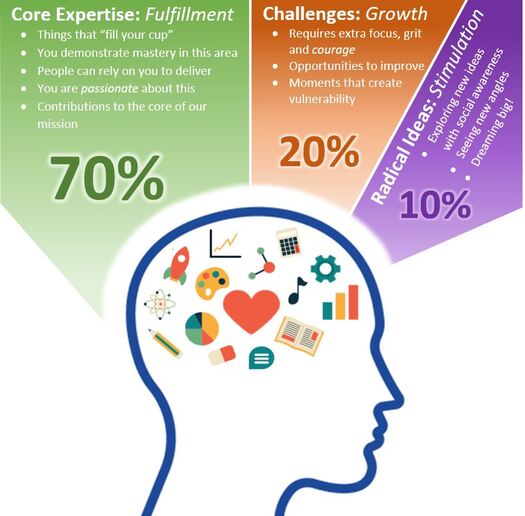20% challenges: growth & courage
Why this is important:
It is easy to find ways to avoid engaging in challenging activities. When left to our own, we will choose to spend time on things that will have the quickest return on our investment, or simply doing things that we enjoy. The odds are, most of these things fall into the 70% mindset bucket that creates fulfillment. Unlike our focus on our core expertise, at times we may need to force ourselves to focus on these challenges. Perhaps we are afraid to fail, or simply want to avoid the unpleasant task or conversation. Facing challenges is what allows us to grow. Surrounding yourself with supportive people will help bring out the courage inside you needed to face challenges. Even when you fail, you have an opportunity learn from that challenge.
It is easy to find ways to avoid engaging in challenging activities. When left to our own, we will choose to spend time on things that will have the quickest return on our investment, or simply doing things that we enjoy. The odds are, most of these things fall into the 70% mindset bucket that creates fulfillment. Unlike our focus on our core expertise, at times we may need to force ourselves to focus on these challenges. Perhaps we are afraid to fail, or simply want to avoid the unpleasant task or conversation. Facing challenges is what allows us to grow. Surrounding yourself with supportive people will help bring out the courage inside you needed to face challenges. Even when you fail, you have an opportunity learn from that challenge.

Examples:
- A nurse in a hospital is highly successful in all core parts of their job. They want to advance their career by enrolling in graduate school. There are opportunities every day to learn more from colleagues, but they are reluctant to reach out because they don't want to be perceived as not understanding certain things. They keep telling themselves, "I'll enroll in school next week". Finally, the nurse talks to a colleague who graduated with an MSN and finds they are excited for them, and wants to be supportive. The nurse enrolls in graduate school and requests special assignments within the hospital that will allow them to be exposed to new experiences and challenges.
- A computer programmer is a highly regarded coder and is known for having very few bugs in their code. However, they often become frustrated with clients in weekly update meetings as the clients often are unware of the complexities of coding. This programmer often avoids or cancels these meetings, which frequently results in missing changes to the application and then writing code that is not needed. Instead the programmer begins to explore internally why they become frustrated. They process this area for improvement with a trusted colleague to get feedback. Over time, they develop skills to better communicate with clients to create more alignment. This investment of their time, and dedication to understanding clients better results in more efficient project manager and fewer struggles with managing expectations. While this requires extra focus, this programmer grows by building a reputation as a great communicator who almost always exceeds expectations.
- An operations manager at the city parks and rec department is very disciplined at managing their time. In any given 8-hour day, they are productive the entire time, all the while responding to the variety of phone calls and emails that come up. The department was approved to implement a new ticketing system nearly 3-months ago that will help automate maintenance issues and improve reporting (i.e. snow making issues in the winter, and pool maintenance issues in the summer). The manager knows that this will be a time consuming project, and they lack confidence with technology. Therefore, this project has remained on the bottom of their list - constantly being bumped by other tasks. After weeks of tolerating inefficiencies and not being able to produce reliable maintenance reports, the manager finally reaches out to their technology consultant and begins to schedule the implementation. Throughout the project the manager has moments where they feel vulnerable and lacks confidence. They learn to trust in the technology consultant and asks a lot of questions, finding ways to grow. The implementation takes several weeks and requires courage, but now the manager has gained new skills and the time spent managing maintenance issues has decreased by 80%.
Click on the buttons below for examples in the other areas: